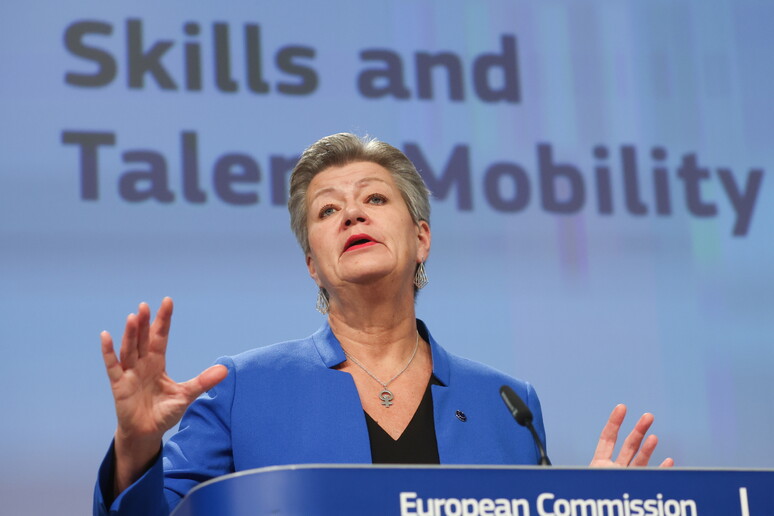According to the European Commission,
the rate of unfilled vacancies rose to 2.9 percent in 2022 and
is more than twice as high as ten years prior. As the population
is getting older on average, the number of people of working age
in the EU is forecast to fall from 265 million last year to 258
million in 2030.
To combat the shortages in the workforce, the European
Commission on November 15 unveiled a new proposal which shall
also foster legal migration. It aims at matching unfilled
vacancies and fields where there is a shortage of applicants
with skilled jobseekers, encouraging mobility also for those who
are learning.
The Commission also made suggestions on how the recognition of
qualifications from third countries could be simplified and
that, for example, national authorities shall be enabled to
speed up procedures by investments in personnel. Information on
recruitment and migration procedures in EU countries shall be
provided, too.
In comparison to most high-income countries, the share of the
foreign-born population in the European Union is lower.
According to Eurostat and OECD data, the population of the EU
has 8.5 percent of foreign-born residents, in contrast to 29.2
percent in Australia or 14.0 percent in the USA.
Countries like Slovenia, Bulgaria and Bosnia and Herzegovina are
also looking outside their own job markets to fill vacancies.
Some are calling for further legislation, pointing out their own
experience with labour mobility and skilled workers leaving
their domestic labour markets.
EU Talent Pool: Matching unfilled vacancies, routes for legal
migration
On November 15, the Commission proposed the creation of an
online platform for job offers in the European Union, the EU
Talent Pool, as well as talent partnerships which are
tailor-made partnerships with non-EU countries, offering
mobility for work or training.
The aim is to ensure that people can come to the EU legally to
pursue jobs matching their skills and qualifications. Another
objective is to open a new front against illegal migration and,
therefore, jointly fight against human traffickers.
According to the Commission Vice President for our European Way
of Life Margaritis Schinas, the starting point of the package
"has to do with the training and work shortages in our markets,
which are worrying, since 75 percent of European SMEs [small and
medium enterprises] say they cannot find the employees they
need."
As an example, he explained that the EU will need 20 million
people working in information and communications technologies
(ICT) by 2030, but that the EU only has nine million people in
this field at the moment. "We are missing eleven million," he
added. While not giving a concrete number of possible recruits
through the future system, Schinas said the EU would like to "to
have as many [workers] as possible as long as they fit the
vacancies."
EU Home Affairs Commissioner Ylva Johansson indicated that these
proposals are also part of "comprehensive approach to migration"
with the creation of "legal pathways". In this context, she
stressed that the EU is going to need more workers in the labour
market by 2030 and that for this "we are going to need more
labour immigration".
Johansson specified that there are sectors with a "clear labour
shortage in the European Union", such as construction, the
health sector, care for the elderly due to demographic
evolution, ICT or transportation.
Brussels has identified 42 scarce occupations throughout the EU,
which are part of the proposed regulation on the talent pool and
which will be adapted according to needs.
The pool will also support the implementation of talent
partnerships. Jobseekers who have developed their skills within
a talent partnership will receive a Talent Partnership Pass,
visible to participating employers, certifying their
qualifications.
Participation for member states would not be legally binding and
the European Parliament and the EU member states still have to
negotiate and approve the proposal before such a platform can be
set up.
National approaches and worries to labour shortage
In South-Eastern Europe, some countries are facing both a
shortage in the domestic labour force and are also experiencing
their own workforces' mobility towards more favourable
conditions in other EU countries.
In Slovenia for example, certain sectors face labour shortages
while unemployment is at its lowest since 1991. The pool of
former Yugoslav countries, from where the workforce has
traditionally come to Slovenia, is emptying. A number of
domestic workers, especially along the border with Austria, work
abroad due to more favourable working conditions. In September,
the amount of EU and third-country workers reached 15 percent of
the total working population of just under one million, doubling
compared to 2010.
Slovenia is looking further afield but for now, the share of
workers from third countries excluding former Yugoslav countries
is negligible, around one per cent of the total labour force.
Slovenian Prime Minister, Robert Golob, stressed at the European
Council meeting in Granada in October that the best way to
manage migration effectively is through legalisation - because
Europe needs labour. Regarding relations with third countries,
he called for development aid and migration management to be
linked, as the EU has done in its agreement with Tunisia.
Bulgaria, who is an EU member but not a member of the
border-free Schengen area, implements EU law on the free
movement of workers by opening its labour market to EU
nationals. Labour and Social Policy Minister, Ivanka
Shalapatova, said on October 20, that the Bulgarian government
was working on a measure facilitating the import of foreign
labour in cases when the possibility to activate Bulgarian
citizens is exhausted.
ALL RIGHTS RESERVED © Copyright ANSA











